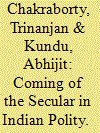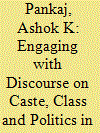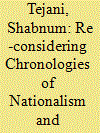|
|
|
Sort Order |
|
|
|
Items / Page
|
|
|
|
|
|
|
| Srl | Item |
| 1 |
ID:
079532


|
|
|
|
|
| Publication |
2007.
|
| Summary/Abstract |
Instead of searching for a definitive connotation of what is 'secular', the present essay explores how secular concepts gradually arrived on the scene of the Indian polity from a variety of areas and re-examines possibilities of probing the place of the secular in Indian polity by problematising its practice over time. Our methodology involves a shift of focus in searching for the roots of this concept in local and peripheral arenas rather than central texts and events. The dynamics of Indian centre-periphery relations have been dominantly historicised by the struggle for independence. This essay highlights the relevance of peripheral texts in defining secular aspects of polity, examining the dominant texts of the centre from the vantage point of the margin. While documenting an alternative discursive construction of secular politics in India, a sociologically informed reading on the question of 'the secular' argues that it will never dominate Indian politics without multiple challenges
|
|
|
|
|
|
|
|
|
|
|
|
|
|
|
|
| 2 |
ID:
079530


|
|
|
| 3 |
ID:
079533


|
|
|
|
|
| Publication |
2007.
|
| Summary/Abstract |
This article maps the changing profile of pre-Mandal and post-Mandal debates on caste, class and politics in India, showing that the centrality of caste as an agent of politics and its dominant role in public-political life has remained a reality throughout. What is contested now is the extent to which recognition of caste as an instrument of socio-political change (following the Mandal Commission) and caste-centric socio-political movements of the 1980s and 1990s (the Dalit and Backward Class movements) has reinforced caste-centric public-political life by giving it a modern value and a secular purpose.
The article argues that the contemporary elaborate discourses on caste, class, and politics in India should seek to develop new paradigms for the discussion of caste and should interrogate more vigorously the democratic and secular roles of caste in relation to class and politics
|
|
|
|
|
|
|
|
|
|
|
|
|
|
|
|
| 4 |
ID:
079531


|
|
|
|
|
| Publication |
2007.
|
| Summary/Abstract |
In Shalimar the Clown, Salman Rushdie fashions a novel of global proportions, tracing the interlacing fortunes of characters from a small Kashmiri village and from the metropolises of North America and Europe. Against the backdrop of international networks of diplomacy, capital and Islamic terrorism, and the repressive forces of the Indian state, Rushdie explores both vernacular and global articulations of cosmopolitanism. The essay argues mainly that Rushdie draws in this novel on the ideal of Kashmiriyat to imagine possibilities of conviviality across religious differences. Ultimately, he projects this ideal of a reconstituted Kashmiriyat, characterized as a vernacular form of cosmopolitanism, onto a global screen. Appealing as such a projected ideal might be, it is problematic in that it advances an elite vision of cosmopolitanism
|
|
|
|
|
|
|
|
|
|
|
|
|
|
|
|
| 5 |
ID:
079529


|
|
|
|
|
| Publication |
2007.
|
| Summary/Abstract |
In 1920, M.K. Gandhi launched the Non-cooperation campaign, his first attempt at mass anti-colonial mobilisation. It quickly became aligned with the Khilafat movement-a mobilisation among Indian Muslims to protect the position of the Khalifa after the defeat of the Ottoman Empire. Scholars have seen this moment as the high point of cooperation between India's Hindus and Muslims, with a real possibility for unity in the nationalist movement. However, the campaigns ended within two years and, after 1922, differences among the leadership intersected with violent conflicts between Hindu and Muslim communities in a number of different regions; the promise of the preceding years appeared shattered, some argue for ever. Scholarship on the Khilafat movement has been teleological, tending to read it either as part of the story of 'Muslim separatism' or subsuming it into the forward march of Indian nationalism.
Arguing that the picture drawn by the existing scholarship is misleading, this article asks if the Khilafat movement can really have a story of its own. Through examining the campaign in Sind, it shows that at the grassroots it was made up of a complex set of alliances, often little related with religious difference or Indian nationalism, made and broken right from its inception. Rather, it argues that political developments in the post-Khilafat period proved crucial to the way that nationalism and communalism would come to be defined
|
|
|
|
|
|
|
|
|
|
|
|
|
|
|
|
|
|
|
|
|